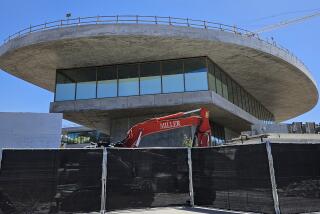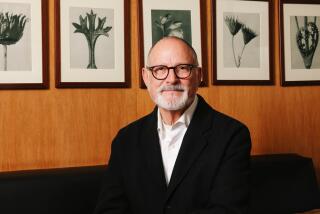Roundup: Palestinian Museum opens empty, George Lucas museum still looking for a home, a Zaha Hadid retrospective
A museum opens in Palestine — but without any art. George Lucas may once again may be ogling California as a site for his Museum of Narrative Art. And the status of London’s hyper-expensive Garden Bridge may be imperiled now that there’s a new mayor in town. Plus: Plans new and old for L.A.’s Pershing Square, the Turner Prize shortlist, and warehousing Hong Kong’s protest art.
— The brand-new Palestinian Museum opens without any exhibitions after a conflict between the director and board.
— The prestigious Turner Prize shortlist has been released. Among the nominees: An artist who crafted an 18-foot sculpture of buttocks and another who built a miniature train that viewers were allowed to ride. Guardian critic Adrian Searle is intrigued. Keep it coming, art world.
— L.A. art dealer Stefan Simchowitz and artist Ibrahim Mahama settle their legal cases against each other over the sale of Mahama’s jute sack works. The settlement was confidential.
— Paintings stolen from the Castelvecchio museum in Verona have turned up in Ukraine. (Artnet)
— Artist Alfredo Barsuglia’s pool in the Mojave Desert is no longer.
— With possibilities looking slim in Chicago, George Lucas is once again eyeballing San Francisco for his museum. Also, Mayor Garcetti is offering up downtown Los Angeles. Perhaps L.A. would be better served by affordable housing rather than another rich guy museum. Just sayin’.
— The Museum of Latin American Art in Long Beach turns 20. William Poundstone pays a visit, capturing one of the more curious sights on view: A giveaway stack print by Felix Gonzalez-Torres … displayed in a frame on the wall. Bizarre.
— Spencer Tunick wants naked women to pose outside of the Republican National Convention in Cleveland. Because that’ll make a statement of some kind.
— Tate Britain has been reluctant to disclose how much funding it has gotten from oil giant BP over the years.
— With a new mayor in power, London’s proposed Garden Bridge may not get off the ground. In sort of related news: Design writer Alexandra Lange looks at the rise of super parks. (ArtsJournal)
— Rich people things: Steve Tisch’s ritzy art “shed” in Benedict Canyon and the swank LACMA fundraiser he hosted inside of it. To quote museum director Michael Govan: “How lucky are we to have Steve Tisch on this planet?” I feel so blessed.
— Related: Stealing the forks of the 1%.
— A storage space in Kowloon houses the objects made by Hong Kong protesters during the Umbrella Movement of 2014.
— A retrospective of the work of Zaha Hadid opens in Italy at the end of May, alongside the Venice Architecture Biennale.
— Plus, a look at the Brazilian maid’s home that will be featured at the Biennale. (If you’re interested in issues of design and the working class, be sure to check out the Brazilian feature film “The Second Mother,” which explores the architecture a domestic servant is expected to occupy in a well-to-do household. Excellent flick.)
— A key design by organic architect Bruce Goff has been destroyed in Norman, Okla. (Goff designed LACMA’s remarkably bizarre Pavilion for Japanese Art.)
— “The concept is to make it humane, inviting and, I’d even go to romantic.” What architect Ricardo Legorreta said about his design for downtown L.A.’s Pershing Square back in 1994. French landscape firm Agence Ter has been selected to remake Legorreta’s design, now widely regarded as inhospitable to the city around it.
— L.A. Times architecture critic Christopher Hawthorne looks at the architecture of new film “High-Rise,” based on the dystopian novel by J.G. Ballard. Plus: A roundtable on the film over at Citylab.
— An exhibition in Chicago explores how Playboy magazine popularized Modernist architecture.
— “In the world of fantasy feminism, there are no class, sex and race hierarchies that break down simplified categories of women and men, no call to challenge and change systems of domination, no emphasis on intersectionality.” bell hooks critiques Beyonce’s “Lemonade.”
— Last, but not least: How to Talk About Art History explains why Classical statuary come with small penises. Warning: The link contains art historical Full Monty.
Find me on Twitter @cmonstah.
More to Read
The biggest entertainment stories
Get our big stories about Hollywood, film, television, music, arts, culture and more right in your inbox as soon as they publish.
You may occasionally receive promotional content from the Los Angeles Times.











